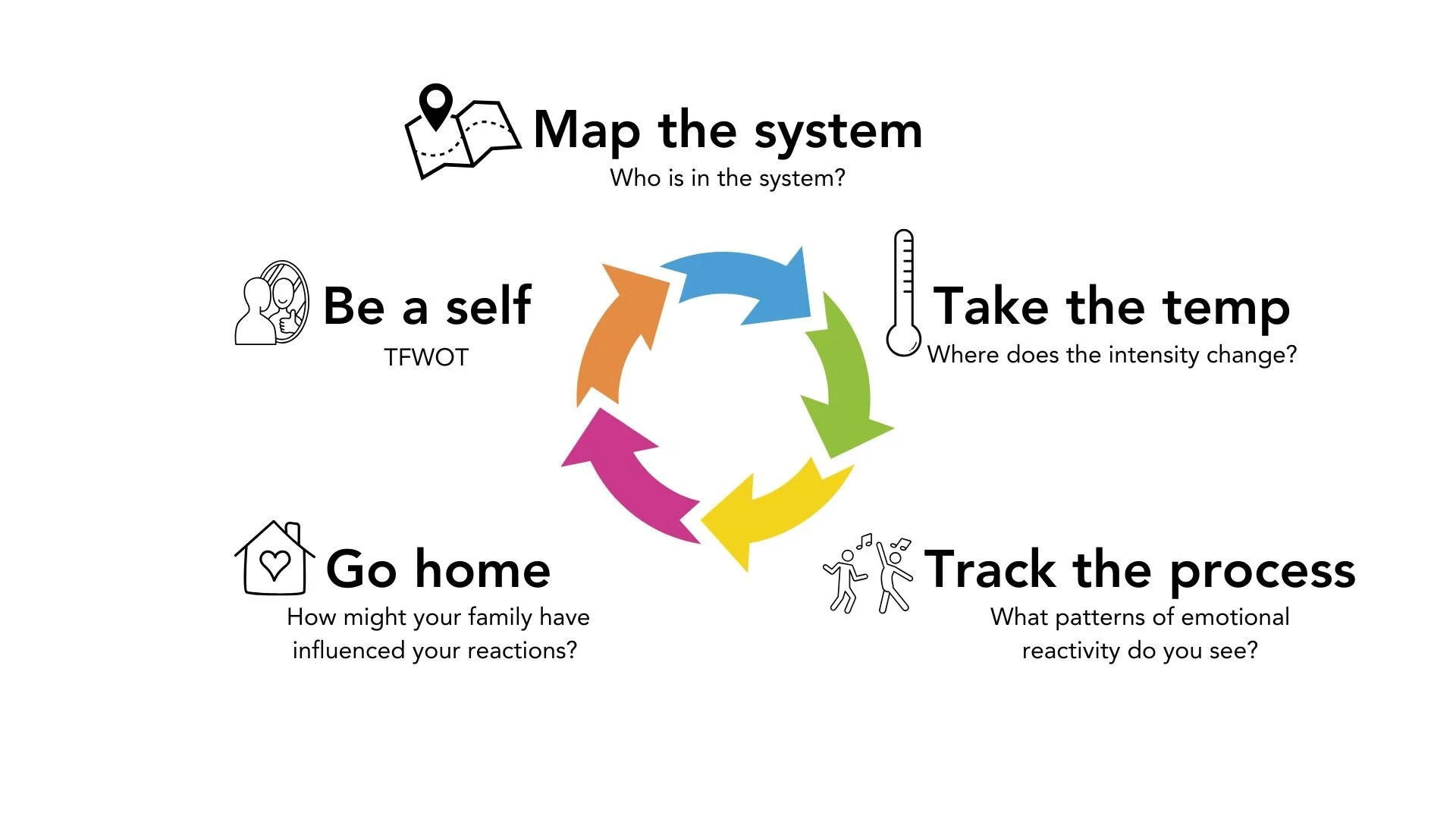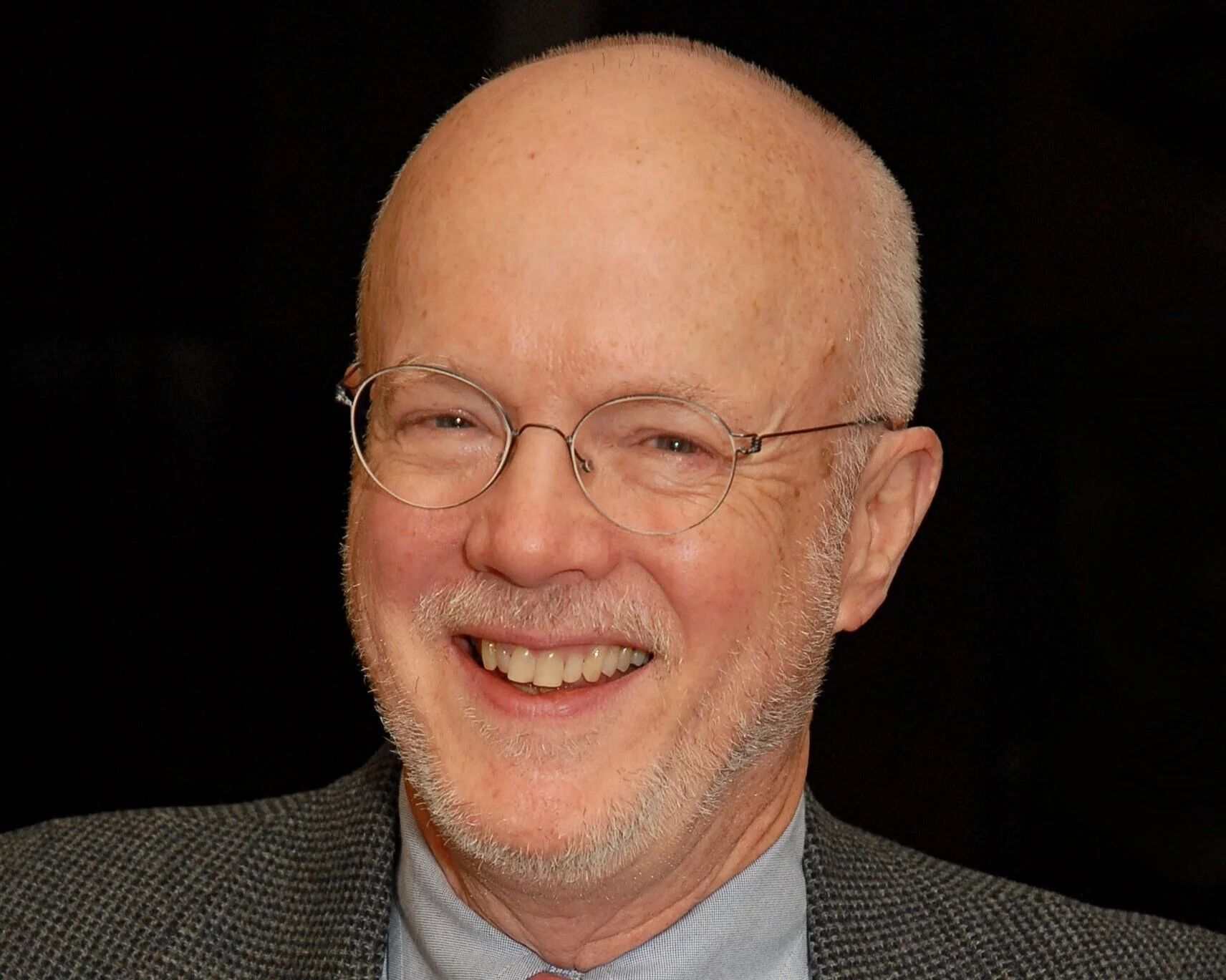
Zoom out
and see clearly
We use Bowen Family Systems Theory to help Christian leaders grow more emotionally mature and healthy, so they can navigate relationship challenges with more clarity, calm and connectedness as they seek to serve the Lord Jesus and his church faithfully.
“Leaders face a steady onslaught of internal and external pressures we are not trained to handle. We focus on skill development and hone our gifts but too often neglect the most powerful leadership tool: awareness of what is happening under the surface. All manner of triggers, reactivity, and stories we tell ourselves bubble just under our conscious awareness. This boiling collective blocks our capacity to be present because it takes energy to manage, especially when we’re not aware of it or when we’re reacting unconsciously to anxiety in someone else…Because leadership involves at least one other person it involves at least one other boiling collective. So leadership becomes about the emotional context: yours and theirs.”
— Steve Cuss, Managing Leadership Anxiety
We help you see and think for yourself
how do tensions in your key relationships impact your feelings and behaviour?
what are some instinctive ways you react to those tensions?
how does the family you grew up in influence the way you react to relationship pressures?
how would you like to show up differently?
Curiosity is the key to change
Imagine a kid reaching into a showbag filled with goodies. They’re bursting with anticipation. And when they pull their hand out their eyes open wide. They hold it up and look at it. They turn it over, wondering what it will taste like. Salty? Sour? Sweet? Bitter? Chewy? They unwrap it, pop it in their mouth and roll it around.
Bowen theory is like a show bag filled with juicy ideas. And in every single changeroom session we reach in, pull some out, turn them over, wonder about them, open them up and chew on them.
As we roll each part of the theory around in our mouths it opens up new ways of seeing and thinking about the challenges we face. We often notice things we’d never noticed before but once we see them we can’t unsee them because they make so much sense of our experience.
Bowen theory is a way for us to get curious about how we show up in our relationships and in our workplaces. It doesn’t tell us what to do. But it helps us see the challenges we face more clearly and invites us to choose how we want to respond based on our own convictions.
In my ministry, my personal relationships and now in my work I have found it to be a great resource for helping me to be less reactive and more thoughtful about how I’m showing up when things are messy or intense.
What is Bowen Theory?
All creatures react anxiously when they perceive a threat or feel uncomfortable. And because humans are social creatures who depend on each other for stability, we feel uncomfortable - and react - when our relationships get tense. So we are always trying to keep our relationships in a comfortable balance. We want people close but not too close. We want our own space but not too much space. We want to be our own person but we want to lean on others at the same time.
When someone gets too close (perhaps by telling us what to do) we feel uncomfortable. When someone seems too distant (perhaps by not giving us the support we’d like) we feel uncomfortable. And when we feel uncomfortable we react instinctively to get the relationship back in balance.
Bowen theory observes 4 basic ways people react to relationship tensions:
Conflict - we dump the tension on someone
Distance - we avoid someone
Over/under function - we function for someone or allow them to function for us
Triangle - we draw a third person into the tension perhaps by venting to them
Our reactions change the relationship balance.
If we pursue someone who feels too distant.
Or pull away from someone who feels too close.
Or criticise someone who feels too different
Or start doing things for someone who seems unable to do it themselves.
It changes the balance in our relationships. And so other people react to our reactions. And we react to their reactions. And on it goes!
It can feel like we’re caught up in a dance. Repeating the same moves. Going round in circles. Stuck together. Unsure how to change.
This is normal human behaviour. But sometimes we reach a point where our automatic reactions are not helping us feel more stable. Instead we feel stuck in patterns of relating that we are no longer willing to repeat and we want to break out of the dance.
Can we interrupt our automatic dance steps and break out a new move?
The challenge is to grow our capacity to deal with tension and discomfort so that we can choose how we want to respond to challenges rather than letting our reactivity spill over, making the mess worse.
Bowen theory calls this “differentiation of self”. And it depends on our “ability to define self in relationship systems” (Dr Michael Kerr).
Defined and connected
The more “differentiated” - or clearly defined - we are the greater our capacity to respond thoughtfully instead of reacting anxiously when relationships get out of balance. It’s about “being fully yourself while being fully connected to other people” (Steve Cuss).
Of course this is really hard to do. As social creatures our instinct is to keep relationships stable and comfortable, either by imposing our “self” on others or by giving up “self” for the sake of relationship harmony.
So at changeroom we work at learning to learn to relate to others more out of our own principles (“self”) than out of our reactivity to others. We want to notice the automatic relationship patterns (the reactivity), get clear about how we want to show up differently and allow space for others to define how they want to show up. Jim Herrington and Trisha Taylor sum this up with two words - “defined and connected”.
What can we do to be more clear, calm and connected?
At changeroom we use this map to navigate the process of “defining self”
Hope
I find Bowen theory helpful because it not only reminds me that it’s normal for humans to react anxiously but it also recognises that we have capacity for responding more thoughtfully.
We can step back from a problem, get curious about what is going on, think about what is important to us and choose how we want to show up.
We can work at being more ourselves while allowing others the space to be themselves.
This is never easy.
But it is possible. Because humans are not simply social creatures. We are also people who have been made in God’s image and who through faith in Christ are being redeemed. Which means we can be confident that we are not in this on our own. God’s life giving power is at work in us. His Spirit is growing and changing us, helping us to bear fruit so that our lives and relationships reflect the character and purposes of Jesus.
And this not only brings glory to God - it is good for us and our relationships.
“It may seem counterintuitive, but the ability to be an individual while closely involved with others enhances the stability and adaptive capacities of a relationship system….A hallmark of a successful effort to define “self” is that it does not disrupt a relationship but, rather, solidifies it.”
- Dr Michael Kerr
FAQs
What does a typical session look like?
Each session is different but I find it often helps if they follow a process something like this:
FOCUS: clarify what the client or supervisee is bringing to the session
EXPLORE: consider the issue from different angles, drawing on Bowen theory and theological reflection to gain new insights
DEFINE: articulate the client/supervisee’s convictions, thoughts, feelings, desires and responsibilities and how these might guide them
ACTION: what will the client/supervisee take out of the session to work on
What is the difference between coaching & supervision?
In coaching my focus is on the client and my goal is to help them grow in emotional and spiritual maturity so they can navigate relationship challenges in family, work or ministry life.
In supervision my focus is not only on the supervisee but also on those they serve (sometimes called ‘the unseen other’). My aim is to help supervisees become more faithful, effective and healthy in their ministry (or work) practice. We will often still consider other areas of their life (eg. family) but the main focus is on their ministry (or work). Like coaching, supervision seeks to bring growth but it also aims to provide support and accountability. So it has formative as well as restorative and normative functions.
In both coaching and supervision I find that Bowen theory is a very helpful lens for helping those I work with think about the issues and challenges they bring to a session.
Do you offer sessions online or in person?
99% of my coaching and supervision work is online. I actually find this works really well. I notice that I seem to think more clearly when I’m not in the same room with someone. From a Bowen theory perspective this might be because the extra bit of difference means I’m less likely to get caught up in the emotional/relational system of my clients and supervisees.
I think I’m interested in coaching or supervision but I’m not 100% sure. What should I do?
Book an initial chat. It’s free of charge and there’s no strings attached. It’s a great way for me to understand what you’re hoping to work on and for you to understand my approach and for us both to make an informed decision about whether we’re a good fit.
What does Bowen theory mean when it talks about “anxiety”?
In Bowen theory “anxiety” is a normal human reaction to pressure or tension in a relationship. We all depend on other people to help us feel safe and stable. Sometimes people get too close. Sometimes are too distant. Sometimes they are over involved and other times under involved. We are all constantly shifting as we try to keep a comfortable balance. But what is comfortable for me might not be comfortable for you. And this creates a tension. It is destabilising. So we react instinctively to try to restore that balance we seek.
What does my family of origin have to do with it?
Each family has its own emotional balance or intensity. And it has its own ways of keeping that comfortable. Some families fight. Others avoid conflict at all costs. Some families distance. Others get highly involved in each other’s business. Lots of families will focus a lot of energy on a particular family member (it can be positive or negative attention). And many families struggle to tolerate the intensity and so family members will cut themselves off from others. All of these reactions are mechanisms - like an emotional thermostat - which families use to adapt to the stresses and challenges of life and keep the emotion in some kind of balance. The thing is we all take the patterns we learned in our family into our other relationships. If you took on the role of ‘peace keeper’ in your family it’s likely you try to damp down conflict when it arises in your workplace. If you were a highly relational, relaxed youngest child with less responsibility growing up, it’s likely that this will shape both the strengths and weaknesses you bring to your work team. This also helps explain some of the challenges we experience when we get married. Each spouse grew up in different families, that had its own emotional balance and its own mechanisms for keeping things comfortable. Each family is playing by its own rules. In fact sometimes I think my family must have been playing a totally different sport than the family my wife grew up in. And so I go about everyday life trying to play football - doing things without thinking because they seem so normal to me. Meanwhile my wife is trying to play golf. You can imagine how that might get complicated!







